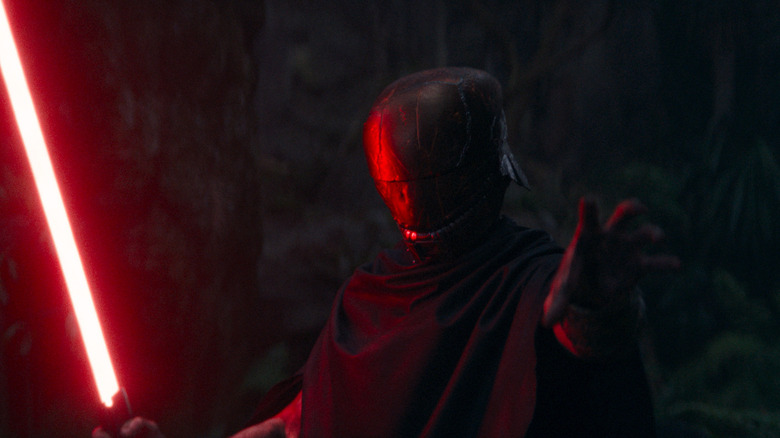Is The Acolyte’s Villain Really A Sith? Here’s What We Know
This article contains spoilers for “Star Wars: The Acolyte” Episode 5, “Night”
“Star Wars: The Acolyte” Episode 5, “Night,” has revealed the identity of the masked villain who’s been training Mae (Amandla Stenberg) in the shadows. In a twist that many saw coming, but which still hits thanks to one of the best “Star Wars” lightsaber fights we’ve ever seen, Qimir (Manny Jacinto) and the dark Force user turn out to be one and the same. It seems that he was only masquerading as the meek poison brewer in order to keep a closer eye on Mae. And yet, this reveal hasn’t actually told us much about who he really is.
Qimir (we’ll keep using that name for now) tells Master Sol (Lee Jung-jae) that he has no name, but that the Jedi would probably call him Sith. So, is he? The turn of phrase suggests not — that he’s simply comparing himself to the Jedi’s ancient enemy to drive home the point of what he stands for. But wouldn’t that kind of make him a Sith anyway, regardless of external affiliation?
The rules of what is and isn’t a Sith are rarely consistent throughout “Star Wars,” and that’s especially true in the thousand years before “The Phantom Menace,” when the dark order is believed to be extinct. But the man’s lightsaber is red, and he talks an awful lot about power. Seems pretty Sith-coded, right?
Qimir’s power suggests he was trained
The biggest argument that Qimir is a proper Sith plays out over the course of “The Acolyte” Episode 5 — his undeniable Force power and skill with a lightsaber. During the battle on Khofar, he faces off against a team of eight Jedi by himself, plus Mae and Osha. We see him easily taking on as many as four at once, and he kills every single Jedi except for Sol by the time the night is over.
These aren’t just casual kills, either. Qimir has a deep bag of tricks, and he uses them all to lay waste to his enemies. In one shot, he impales a Jedi on his saber, then Force-pulls another onto the blade before decapitating them both. When he kills Jecki (Dafne Keen), who puts up an impressive fight for a padawan, Qimir reveals that his saber hilt can be split into two, using the second blade to run her through with three quick staccato blows. He has a clear mastery of the Force, though there’s no lightning to be seen. And, like a Sith, he seems to take a perverted kind of pleasure in causing the Jedi pain.
All in all, his skill is too high to chalk up to natural talents. It seems pretty obvious that he was trained by someone, but we don’t know who. Qimir claims to know Sol, but the Jedi master doesn’t recognize his face. Yord does, but he can’t provide an explanation before the villain snaps his neck.
Qimir doesn’t seem like the Sith we’re used to
There are certainly similarities between Qimir and the Sith we’ve seen in the main “Star Wars” movies. Beyond the red lightsaber, scary mask, and black robes, the way he talks is reflective of core Sith morals. When Sol asks him what he wants, he answers, “Freedom. The freedom to wield my power the way I like without having to answer to Jedi like you.” He laments that people like him — those who use the Force outside the rigid dogma of the Jedi — aren’t allowed to exist.
This is similar to the Sith Code: “Through Passion, I gain Strength. Through Strength, I gain Power. Through Power, I gain Victory. Through Victory my chains are Broken. The Force shall free me.” And yet, Qimir still doesn’t seem like a full Sith. He’s angry at the Jedi and clearly full of hate, but he doesn’t appear to have some grand scheme to attain ultimate power. That is to say, while he may be a Sith in code and belief, it seems less likely that he’s one of the “Rule of Two” Sith in the galaxy at this time, or that he explicitly ascribes to their religion. “The Acolyte” isn’t too far removed from the reign of Darth Plagueis and his master, Darth Tenebrous, but Qimir likely isn’t part of that direct lineage.
What he wants, ultimately, is an acolyte, he says, someone to whom he can pass on his beliefs. It’s the same thing that the witches of Brendok wanted, and it’s the reason the Jedi abduct children to foster their numbers. But is he continuing a specific dark side lineage? Seeking to overthrow his own hidden master, as Sith apprentices often do? Or is he the first of his specific kind, just looking for a way to ensure his longevity?
The sequel trilogy might hold a clue
Besides the Sith reference, there are some other clues as to what exactly Qimir might be. Multiple times when talking to Sol, he references “Jedi like you,” as opposed to just saying “Jedi.” Does that mean that he could have been trained by rogue Jedi from a splinter faction, as some characters theorize earlier in the show? Potentially. Regardless of where he came from, the end of “The Acolyte” Episode 5 leaves a curious musical cue that might foreshadow where he’s going.
As Qimir leans over the unconscious Osha, the music twists briefly into a soft refrain of Kylo Ren’s theme from the sequel trilogy. This could simply be an aesthetic tie between two young, ripped dark side users, but there are more implications hiding in the “Star Wars” comics. In the movies, we only briefly see the Knights of Ren — the masked squad of baddies led by Kylo on his various campaigns. The 2019-2020 Marvel Comics series “The Rise of Kylo Ren” depicts this group in more detail, revealing that it’s always led by a masked warrior with a red lightsaber who uses the name Ren. Both the title and the weapon are passed down from one leader to the next.
Qimir fits the bill perfectly for an ancient Ren, right down to his sleeveless fit and his DIY helmet. This would also allow him to exist in a not-quite-Sith space. Since the Knights are still pretty unexplored in canon, there’s plenty of room for “The Acolyte” to add in more backstory, should this theory prove correct.





